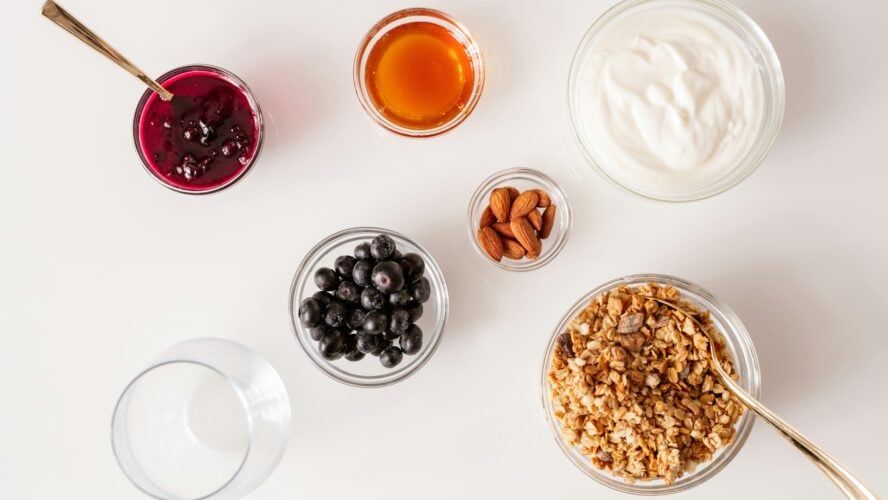What’s the Best Yogurt for Gut Health, and Could It Help You Live Longer?
The oldest person in the world ate yogurt multiple times per day. Here’s why researchers believe yogurt played a role in her longevity.

Cottage cheese may be all the rage right now — but when it comes to diet and longevity, you might be better served by another product in the dairy aisle. Dairy yogurt may be the best yogurt for gut health. A new study delved into the eating habits of Spain’s Maria Branyas Morera, who until she died last year at 117 years old was the world’s oldest person, showcases her particular affection for yogurt: She consumed three servings of the stuff per day1.
Of course, Branyas’ yogurt consumption doesn’t stand alone. She also ate a Mediterranean diet high in fruits, vegetables, and whole grains and low in processed foods, added sugars, and red meat. She didn’t smoke or drink alcohol, exercised regularly, and spent time with others. But according to experts and the researchers behind the as-yet peer reviewed study, yogurt definitely played a role in her long life. What type of dairy yogurt is the best? Read on to find out.
Want more smart wellness advice? Sign up for the newsletter for more well-researched, non-toxic living guidance.
Health Benefits of Yogurt

Many of yogurt’s health benefits come down to the fact that it’s teeming with healthy bacteria. In their analysis of Branyas’ gut microbiome, the researchers behind the new study discovered an unusually high number of Bifidobacterium. These bacteria, which are bacteria boosted by yogurt consumption, help digest fiber, prevent infection, and have even been found to help produce healthy fatty acids2 and vitamin B3 in the gut.
Yogurt is also rich in Lactobacillus, another strain of bacteria that boosts gut health by producing lactic acid. This drops the pH in your gut, keeping dangerous pathogens at bay. Studies have found that Lactobacillus may help reduce cholesterol4, prevent vaginal infection5, and boost immunity6.
The Brain-Gut Connection
Improved gut health has far wider benefits than just regularity. Modern science attests to a brain-gut connection linking gut health to everything from mood to mental health disorders like depression and anxiety7. The connection goes both ways: While a healthy mind keeps your gut working as it should, a healthy gut can also help improve your mental health, mood, and even memory8.
In addition to this wealth of healthy bacteria, research has also linked yogurt to a number of other health advantages9. A 2022 research review highlights benefits including the prevention of osteoporosis, diabetes, and cardiovascular disease, among others10. Yogurt is a great source of protein, phosphorus, and B vitamins, and a one-cup serving provides almost half of your daily recommended intake of calcium.
How to Enjoy the Health Benefits of Yogurt
So is yogurt healthy for you? Yes, but it depends heavily on what kind of yogurt you’re eating. If you hope to reap all of the health benefits of yogurt, it’s essential to bear two things in mind: quality and consistency.
What Kind of Yogurt Is Best for Your Health?
Not all yogurt is created equal. Many yogurts contain loads of added sugars, which transforms them from a health food into a junk food. A 2018 study in the British Medical Journal surveyed nearly 1,000 yogurt brands, finding that the average amount of sugar was well above 10 grams per 100-gram serving11. Unsurprisingly, this is mostly a problem when it comes to flavored yogurts — so if you’re looking to reap the health benefits, plain yogurt is the way to go.
Why Greek Yogurt Comes out on Top

Greek yogurt is naturally lower in sugar than other yogurts, seeing as it is strained to remove the lactose-containing whey12. The health benefits of greek yogurt also extend to its high protein content, so it’s also good for building muscle and contributing to well-being. Choose full-fat yogurt, which is richer and helps you stay full longer, and is also devoid of the added sugars and stabilizers often added to low- or non-fat options.
It’s also important to pay attention to the bacterial content of yogurt, which varies from brand to brand. If you’re stumped trying to choose yogurt at the grocery store, look for an on-package indication of colony forming units (CFUs), which refers to the number of living bacteria per gram of yogurt. Yogurt typically contains at least 106 CFUs, the minimum needed to display a “Live and Active Cultures” seal on the packaging.
How to Incorporate Yogurt Into Your Diet
Of course, you’ll need to consume yogurt regularly to reap the most benefits. Branyas ate yogurt a whopping three times a day, which meant her gut bacteria was constantly topped up.
Consider reaping the benefits of yogurt for gut health by enjoying a protein-rich yogurt bowl topped with nuts, seeds, and berries each morning, or with your favorite homemade granola (try our recipes for easy homemade granola). Add a dollop of yogurt to your favorite lunchtime salad dressing or buddha bowl, and turn yogurt into a delicious, herbaceous sauce like tzatziki or raita to enjoy with dinner. For dessert, you can also enjoy yogurt topped with fresh berries and drizzled with raw honey for a delicious, anti-microbial boost.
Yogurt Recipes to Try

Final Thoughts
At the end of the day, yogurt is just one thing that may supposedly make a difference in our lifespan — and it’s certainly not the first. Researchers have studied links between longevity and a variety of things, from coffee to various blue foods to the ideal amount of exercise.
Realistically, no single one of these things will unlock a magic cure to a longer life. And the benefits of eating yogurt every day aren’t going to make much of a difference if you’re not otherwise taking care of yourself. But if you’re living an overall healthy lifestyle and simply want to try making a change, yogurt probably won’t hurt.
Sources:
- https://www.biorxiv.org/content/10.1101/2025.02.24.639740v1.article-info
- https://pubmed.ncbi.nlm.nih.gov/12492934/
- https://pmc.ncbi.nlm.nih.gov/articles/PMC1797147/
- https://pubmed.ncbi.nlm.nih.gov/26512560/
- https://pubmed.ncbi.nlm.nih.gov/27826653/
- https://pubmed.ncbi.nlm.nih.gov/23372900/
- https://www.hopkinsmedicine.org/health/wellness-and-prevention/the-brain-gut-connection
- https://www.nia.nih.gov/news/beyond-brain-gut-microbiome-and-alzheimers-disease
- https://pmc.ncbi.nlm.nih.gov/articles/PMC9455928/
- https://pmc.ncbi.nlm.nih.gov/articles/PMC9455928/
- https://bmjopen.bmj.com/content/8/8/e021387
- https://www.medicalnewstoday.com/articles/323169

